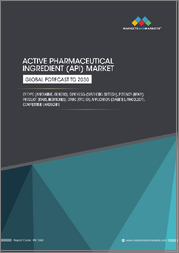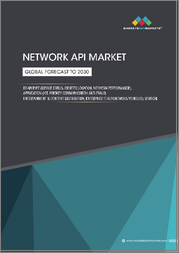
|
시장보고서
상품코드
1699263
고효능 원료의약품(HPAPI) 시장 - 기회, 성장 촉진요인, 산업 동향 분석, 예측(2025-2034년)High Potency Active Pharmaceutical Ingredients Market Opportunity, Growth Drivers, Industry Trend Analysis, and Forecast 2025-2034 |
||||||
세계의 고효능 원료의약품(HPAPI) 시장은 2024년 271억 달러로 평가되어, 2025년부터 2034년까지 CAGR 8.8%를 나타낼 것으로 예측됩니다.
HPAPI는 최소 용량으로 강력한 생물학적 효과를 제공하는 특수 의약품 화합물이며, 그 효능을 위해 엄격한 취급과 제조 공정이 필요합니다. 이러한 성분은 전신 독성을 억제하면서 더욱 효과적인 약물 전달을 가능하게 하기 때문에, 현대의 표적 치료, 특히 암 치료에 있어서 중요한 역할을 하고 있습니다.

시장은 합성 HPAPI와 생명공학 HPAPI로 나뉘며, 합성 부문은 2024년 180억 달러의 수익을 올렸고, CAGR 8.7%로 성장할 것으로 예상됩니다. 합성 HPAPI는 확장 가능한 제조 공정으로 인해 대규모 생산에 효율적이며 널리 선호됩니다. 세포 배양과 발효와 같은 복잡한 공정을 필요로 하는 생명공항 HPAPI와 달리, 합성 HPAPI는 확립된 화학적 절차로 제조되기 때문에 의약품 개발 타임라인이 단축됩니다. 만성 질환의 세계 확산이 증가하는 동안 합성 HPAPI는 정확한 복용량 제어로 표적 치료 효과를 제공하는 능력으로 계속 시장을 독점하고 있습니다.
| 시장 범위 | |
|---|---|
| 시작 연도 | 2024년 |
| 예측 연도 | 2025-2034년 |
| 시작 금액 | 271억 달러 |
| 예측 금액 | 624억 달러 |
| CAGR | 8.8% |
HPAPI 시장은 의약품 유형별로 혁신적 약물과 제네릭 의약품으로 분류됩니다. 혁신적 부문은 2024년 201억 달러로, 시장의 74.3%를 차지했습니다. 암, 자기면역질환, 기타 복잡한 질환에 대한 고도의 치료에 대한 수요로 인해, 높은 유효성을 가진 HPAPI에 대한 투자가 증가하고 있습니다. 봉쇄 시스템과 연속 제조 공정의 지속적인 기술 진보는 엄격한 규제 요건에 대한 컴플라이언스를 확보하면서 생산을 합리화하고 있으며, 지속 가능한 제조 기술의 채용으로 HPAPI 개발에 있어서의 제조 비용의 삭감과 안전성의 향상이 진행되고 있습니다.
시장은 또한 제조업자 유형별로 자사 생산과 외부 위탁 생산으로 구분됩니다. 특수한 봉쇄 시설에 관련된 비용이 높기 때문에, 많은 제약회사가 HPAPI의 제조를 수탁제조기관(CMO)에 의지하게 되어 있습니다. 이를 통해 제약회사는 CMO의 전문지식을 활용하여 엄격한 업계기준을 충족하면서 의약품의 연구개발 및 상업화에 집중할 수 있습니다.
용도별로는 암 영역이 계속 지배적인 부문으로, 2024년의 매출은 152억 달러였습니다. HPAPI는 건강한 조직에 영향을 최소한으로 억제하면서 암세포를 공격하는 능력을 가지기 때문에, 암 치료, 특히 화학요법과 표적 치료에 중요한 역할을 하고 있습니다.
지역별로는 북미가 2024년에 124억 달러를 차지했고, 2034년에는 284억 달러에 이를 것으로 예측되고 있습니다.
목차
제1장 조사 방법과 조사 범위
제2장 주요 요약
제3장 업계 인사이트
- 생태계 분석
- 업계에 미치는 영향요인
- 성장 촉진요인
- 암의 유병률 상승
- 표적 요법의 채용 확대
- 고효능 원료의약품의 응용 확대
- 업계의 잠재적 위험 및 과제
- 높은 개발 및 제조 비용
- 엄격한 규제 요건
- 성장 촉진요인
- 성장 가능성 분석
- 갭 분석
- 특허 분석
- 향후 시장 동향
- 규제 상황
- 기술적 전망
- Porter's Five Forces 분석
- PESTEL 분석
제4장 경쟁 구도
- 소개
- 기업 점유율 분석
- 기업 매트릭스 분석
- 주요 시장 기업의 경쟁 분석
- 경쟁 포지셔닝 매트릭스
- 전략 대시보드
제5장 시장 추계 및 예측 : 제품별, 2021-2034년
- 주요 동향
- 합성
- 생명공학
제6장 시장 추계 및 예측 : 약제 유형별, 2021-2034년
- 주요 동향
- 혁신
- 제네릭
제7장 시장 추계 및 예측 : 제조업체 유형별, 2021-2034년
- 주요 동향
- 인하우스
- 아웃소싱
제8장 시장 추계 및 예측 : 용도별, 2021-2034년
- 주요 동향
- 종양
- 호르몬 밸런스의 혼란
- 녹내장
- 기타 용도
제9장 시장 추계 및 예측 : 지역별, 2021-2034년
- 주요 동향
- 북미
- 미국
- 캐나다
- 유럽
- 독일
- 영국
- 프랑스
- 이탈리아
- 스페인
- 네덜란드
- 아시아태평양
- 중국
- 일본
- 인도
- 호주
- 한국
- 라틴아메리카
- 브라질
- 멕시코
- 아르헨티나
- 중동 및 아프리카
- 사우디아라비아
- 남아프리카
- 아랍에미리트(UAE)
제10장 기업 프로파일
- Albany Molecular Research
- Agilent Technologies
- Axplora
- BASF
- Boehringer Ingelheim International
- Bristol-Myers Squibb Company
- CARBOGEN AMCIS
- Cipla
- CordenPharma
- Dr. Reddy's Laboratories
- F. Hoffmann-La Roche
- Lonza
- Merck &Co.
- Novartis
- Pfizer
- Sanofi
- Sun Pharmaceutical Industries
- Teva Pharmaceutical Industries
The Global High Potency Active Pharmaceutical Ingredients Market was valued at USD 27.1 billion in 2024 and is projected to grow at a CAGR of 8.8% from 2025 to 2034. HPAPIs are specialized pharmaceutical compounds that produce strong biological effects at minimal doses, necessitating strict handling and manufacturing processes due to their potency. These ingredients play a crucial role in modern targeted therapies, particularly cancer treatments, as they enable more effective drug delivery while reducing systemic toxicity. With the rising demand for precision medicine, pharmaceutical companies are focusing on expanding HPAPI production capabilities to cater to the growing need for advanced therapies.
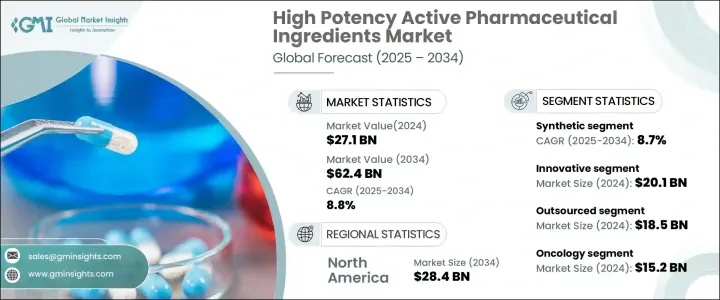
The market is divided into synthetic and biotech HPAPIs, with the synthetic segment generating USD 18 billion in revenue in 2024 and expected to grow at a CAGR of 8.7%. Synthetic HPAPIs are widely preferred due to their scalable manufacturing processes, making them more efficient for large-scale production. Unlike biotech HPAPIs, which require complex processes like cell culture and fermentation, synthetic alternatives are produced using well-established chemical procedures, accelerating drug development timelines. With an increasing global prevalence of chronic diseases, synthetic HPAPIs continue to dominate the market due to their ability to deliver targeted therapeutic effects with precise dosage control.
| Market Scope | |
|---|---|
| Start Year | 2024 |
| Forecast Year | 2025-2034 |
| Start Value | $27.1 Billion |
| Forecast Value | $62.4 Billion |
| CAGR | 8.8% |
Based on drug type, the HPAPI market is categorized into innovative and generic drugs. The innovative segment accounted for USD 20.1 billion in 2024, representing 74.3% of the market. The growing demand for advanced treatments for cancer, autoimmune diseases, and other complex conditions has led to increased investment in high-efficacy HPAPIs. Ongoing technological advancements in containment systems and continuous manufacturing processes are streamlining production while ensuring compliance with stringent regulatory requirements. Additionally, the adoption of sustainable manufacturing techniques is reducing production costs and enhancing safety in HPAPI development.
The market is also segmented by manufacturer type, with in-house and outsourced production. The outsourced segment led the market with USD 18.5 billion in revenue in 2024. The high costs associated with specialized containment facilities have driven many pharmaceutical companies to rely on contract manufacturing organizations (CMOs) for HPAPI production. This allows pharmaceutical firms to focus on drug research, development, and commercialization while leveraging the expertise of CMOs to meet stringent industry standards. As a result, outsourcing has become a strategic move to enhance production efficiency and maintain cost-effectiveness.
In terms of applications, oncology remained the dominant segment, contributing USD 15.2 billion in revenue in 2024. HPAPIs play a vital role in cancer treatments, particularly in chemotherapy and targeted therapies, due to their ability to attack cancer cells with minimal impact on healthy tissues. Their application in advanced drug formulations, including antibody-drug conjugates and immunotherapy, is further driving market demand.
Geographically, North America accounted for USD 12.4 billion in 2024 and is projected to reach USD 28.4 billion by 2034. The U.S. led the region with USD 11.3 billion in revenue, driven by increasing cancer cases and stringent regulatory requirements that support the development of high-potency pharmaceuticals.
Table of Contents
Chapter 1 Methodology and Scope
- 1.1 Market scope and definitions
- 1.2 Research design
- 1.2.1 Research approach
- 1.2.2 Data collection methods
- 1.3 Base estimates and calculations
- 1.3.1 Base year calculation
- 1.3.2 Key trends for market estimation
- 1.4 Forecast model
- 1.5 Primary research and validation
- 1.5.1 Primary sources
- 1.5.2 Data mining sources
Chapter 2 Executive Summary
- 2.1 Industry 360° synopsis
Chapter 3 Industry Insights
- 3.1 Industry ecosystem analysis
- 3.2 Industry impact forces
- 3.2.1 Growth drivers
- 3.2.1.1 Rising prevalence of cancer
- 3.2.1.2 Growing adoption of targeted therapies
- 3.2.1.3 Growing application of high potency active pharmaceutical ingredients
- 3.2.2 Industry pitfalls and challenges
- 3.2.2.1 High development and manufacturing cost
- 3.2.2.2 Stringent regulatory requirements
- 3.2.1 Growth drivers
- 3.3 Growth potential analysis
- 3.4 Gap analysis
- 3.5 Patent analysis
- 3.6 Future market trends
- 3.7 Regulatory landscape
- 3.8 Technological landscape
- 3.9 Porter's analysis
- 3.10 PESTEL analysis
Chapter 4 Competitive Landscape, 2024
- 4.1 Introduction
- 4.2 Company market share analysis
- 4.3 Company matrix analysis
- 4.4 Competitive analysis of major market players
- 4.5 Competitive positioning matrix
- 4.6 Strategy dashboard
Chapter 5 Market Estimates and Forecast, By Product, 2021 – 2034 ($ Mn)
- 5.1 Key trends
- 5.2 Synthetic
- 5.3 Biotech
Chapter 6 Market Estimates and Forecast, By Drug Type, 2021 – 2034 ($ Mn)
- 6.1 Key trends
- 6.2 Innovative
- 6.3 Generic
Chapter 7 Market Estimates and Forecast, By Manufacturer Type, 2021 – 2034 ($ Mn)
- 7.1 Key trends
- 7.2 In-house
- 7.3 Outsourced
Chapter 8 Market Estimates and Forecast, By Application, 2021 – 2034 ($ Mn)
- 8.1 Key trends
- 8.2 Oncology
- 8.3 Hormonal imbalance
- 8.4 Glaucoma
- 8.5 Other applications
Chapter 9 Market Estimates and Forecast, By Region, 2021 – 2034 ($ Mn)
- 9.1 Key trends
- 9.2 North America
- 9.2.1 U.S.
- 9.2.2 Canada
- 9.3 Europe
- 9.3.1 Germany
- 9.3.2 UK
- 9.3.3 France
- 9.3.4 Italy
- 9.3.5 Spain
- 9.3.6 Netherlands
- 9.4 Asia Pacific
- 9.4.1 China
- 9.4.2 Japan
- 9.4.3 India
- 9.4.4 Australia
- 9.4.5 South Korea
- 9.5 Latin America
- 9.5.1 Brazil
- 9.5.2 Mexico
- 9.5.3 Argentina
- 9.6 Middle East and Africa
- 9.6.1 Saudi Arabia
- 9.6.2 South Africa
- 9.6.3 UAE
Chapter 10 Company Profiles
- 10.1 Albany Molecular Research
- 10.2 Agilent Technologies
- 10.3 Axplora
- 10.4 BASF
- 10.5 Boehringer Ingelheim International
- 10.6 Bristol-Myers Squibb Company
- 10.7 CARBOGEN AMCIS
- 10.8 Cipla
- 10.9 CordenPharma
- 10.10 Dr. Reddy’s Laboratories
- 10.11 F. Hoffmann-La Roche
- 10.12 Lonza
- 10.13 Merck & Co.
- 10.14 Novartis
- 10.15 Pfizer
- 10.16 Sanofi
- 10.17 Sun Pharmaceutical Industries
- 10.18 Teva Pharmaceutical Industries







